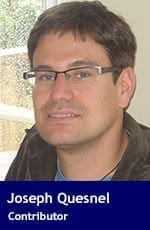 Former U.S. president Barack Obama was in South Africa recently delivering a speech where he was widely praised for issuing a caution to those who embrace identity politics.
Former U.S. president Barack Obama was in South Africa recently delivering a speech where he was widely praised for issuing a caution to those who embrace identity politics.
“We’re able … to get inside the reality of people who are different from us so we can understand their point of view,” Obama said. “And you can’t do this if you just out of hand disregard what your opponents have to say from the start.
“And you can’t do it if you insist that those who aren’t like you, because they’re white or because they’re male, that somehow there’s no way they can understand what I’m feeling, that somehow they lack the standing to speak on certain matters.”
Of course, it’s wrong to assume that someone can’t speak on an issue because of certain fixed characteristics, such as that person’s race or gender.
Someone should politely deliver this memo to the Yellowhead Institute, which is billing itself as Canada’s only Indigenous-led think-tank.
It may be the only one led by Indigenous people, but that doesn’t mean other think-tanks don’t consult and collaborate with Indigenous people. The one I represent, the Frontier Centre for Public Policy, certainly does.
It’s a positive development to have a new think-tank to discuss Indigenous issues. They are some of the most important issues in Canada.
In a commentary in the Toronto Star, Hayden King, the Anishinaabe scholar launching Yellowhead Institute, bemoaned the lack of Indigenous representation in Canadian think-tanks.
“It’s basically a tradition in this country to go to a ‘white Indian expert’ for comment on Indigenous issues,” he said.
Of course, that could be a problem if it were true. But it’s not true.
As a research fellow specializing in Indigenous issues at a think-tank, I frequently comment on Indigenous issues in the media and I always see news stories featuring quotations from First Nation leaders, university professors and community members. I’m frequently quoted on Indigenous issues but my voice is often one among several.
It’s simply not the case that Indigenous voices aren’t being heard in the media and policy discourse.
So what’s this really about?
Reading through the Star piece, it’s apparent that King, a Ryerson University professor, is concerned because some other voices are being quoted more often than his. He can’t handle voices that he says are “right wing.”
Obviously, this is more about what those voices are saying than their identities.
His new institute should focus on building credibility rather than tearing down people he disagrees with.
The Yellowhead Institute has fallen into the identity politics trap that Obama warns against.
Ryerson’s dean of Arts, Pamela Sugiman, says: “I really want to move beyond the rhetoric to do something meaningful and I don’t think people who are not Indigenous can do that. I think it needs to be led by Indigenous scholars.”
But this is a racist perspective and increasingly universities across the country are engaging in these rhetorical claims.
Missing from the standard Indigenous perspective is a concern about the merit of ideas. These academics are devaluing certain voices because of their ethnic backgrounds. Does this mean that one is incapable of saying anything insightful about issues related to groups of which one doesn’t belong?
Yellowhead’s answer is yet more bias.
The seven-member advisory board consists entirely of self-identified Indigenous people. It’s not clear how such an organization will have the independence to examine and question the Indigenous status quo.
In its quest for Indigenous representation, the think-tank falls into a trap common to chauvinistic ventures – prioritizing its voice over those of others because of their identity.
I’ve worked for a decade on Indigenous policies and visited many First Nations across the Prairies. Frequently, there were disconnects between what Indigenous scholars were saying and what common Indigenous people were saying. Indigenous scholars often wore rose-coloured glasses and were apologists for band malfeasance.
The Frontier Centre for Public Policy, where I work, has examined Indigenous policy for more than 20 years. We were the first think-tank to survey average band members on issues of governance and services in the Prairie provinces. Our project was led by a First Nation researcher from northern Manitoba. Over the years, we interviewed thousands of average First Nation people and leaders. We also employed First Nations assistants to collect the data.
The people at the Frontier Centre have been listening to the various voices of First Nation people.
The Frontier Centre warmly welcomes the Yellowhead Institute to the think-tank landscape. We ask them to focus on the merits of ideas and policies, and abandon identity politics, just as Obama recommended.
Joseph Quesnel is a research fellow at the Frontier Centre for Public Policy.
The views, opinions and positions expressed by columnists and contributors are the author’s alone. They do not inherently or expressly reflect the views, opinions and/or positions of our publication.


